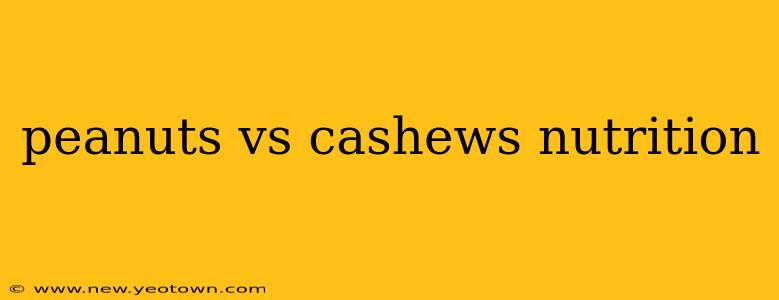Peanuts vs. Cashews: A Nutty Nutritional Showdown
The snack aisle beckons with its tempting array of nuts, but choosing between peanuts and cashews can feel like a nutritional puzzle. Both offer a delicious crunch and satisfying protein punch, but their nutritional profiles tell a different story. Let's delve into the fascinating world of these popular nuts and uncover which one reigns supreme in terms of nutrition, depending on your needs.
Imagine this: you're at the grocery store, torn between a bag of roasted peanuts and a container of creamy cashews. Which one will best fuel your afternoon energy slump, support your heart health, or help you reach your fitness goals? This detailed comparison will help you make the informed choice.
What are the nutritional differences between peanuts and cashews?
This isn't just a simple "better" or "worse" scenario. Both peanuts and cashews offer a wealth of nutrients, but their strengths lie in different areas. Let's break down the key differences:
Peanuts: These legumes (yes, they're technically legumes, not nuts!) are powerhouses of protein and fiber. They're relatively low in saturated fat compared to many other nuts and are an excellent source of resveratrol, a powerful antioxidant linked to various health benefits.
Cashews: These kidney-shaped delights boast a higher fat content, primarily unsaturated fats, which are beneficial for heart health. They're also a good source of magnesium and zinc, essential minerals for numerous bodily functions.
Which nut has more protein?
This one's a close call! Peanuts generally edge out cashews in terms of protein content per serving. While the exact numbers vary depending on factors like the size of the nuts and preparation methods, you'll typically find a slightly higher protein concentration in peanuts. Both, however, contribute meaningfully to your daily protein intake.
Are peanuts or cashews better for heart health?
Both peanuts and cashews contribute to heart health, but in slightly different ways. Cashews' higher unsaturated fat content plays a significant role in lowering LDL ("bad") cholesterol levels. Peanuts, on the other hand, offer a good amount of monounsaturated fats and fiber, contributing to overall cardiovascular well-being. The key here is moderation – enjoying both nuts in sensible portions is beneficial.
Which nut has more fiber?
Peanuts hold the winning card in the fiber department. Their higher fiber content aids in digestion, promotes satiety (that feeling of fullness), and helps regulate blood sugar levels, making them an excellent choice for those seeking to manage their weight or improve their gut health.
Which nut is lower in calories?
While the caloric difference between peanuts and cashews isn't drastic, peanuts generally have slightly fewer calories per serving than cashews. However, portion control remains paramount. A handful of either nut can easily contribute to your daily calorie intake.
Which nut is higher in healthy fats?
Cashews often boast a higher percentage of healthy fats, particularly monounsaturated and polyunsaturated fats, which are essential for various bodily functions, including heart health and brain function. Both nuts, though, provide beneficial fats.
Are there any significant allergy differences?
Peanut allergies are significantly more prevalent and severe than cashew allergies. This is crucial information for individuals with allergies or those preparing food for others with allergies. Always check food labels carefully and be mindful of cross-contamination.
Conclusion:
The "better" nut – peanuts or cashews – depends entirely on your individual nutritional needs and preferences. Both offer distinct nutritional benefits. Peanuts shine with their higher protein and fiber content, while cashews boast a richer profile of healthy fats and certain minerals. Ultimately, incorporating both into a balanced diet, in moderation, can contribute to a healthy and varied nutritional intake. The key is mindful consumption and understanding your body's needs.

